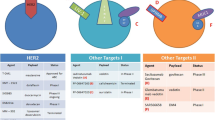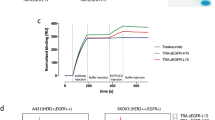Abstract.
Gene amplification, over-expression, and mutation of growth factors, or the receptors themselves, causes increased signaling through receptor kinases, which has been implicated in many human cancers and is associated with poor prognosis. Tumor growth has been shown to be decreased by interrupting this process of extensive growth factor-mediated signaling by directly targeting either the surface receptor or the ligand and thereby preventing cell survival and promoting apoptosis. Monoclonal antibodies have long been eyed as a potential new class of therapeutics targeting cancer and other diseases. Antibody-based therapy initially entered clinical practice when trastuzumab/Herceptin became the first clinically approved drug against an oncogene product as a well-established blocking reagent for tumors with hyperactivity of epidermal growth factor signaling pathways. In the first part of this review we explain basic terms related to the development of antibody-based drugs, give a brief historic perspective of the field, and also touch on topics such as the “humanization of antibodie” or creation of hybrid antibodies. The second part of the review gives an overview of the clinical usage of bispecific antibodies and antibodies “armed” with cytotoxic agents or enzymes. Further within this section, cancer-specific, site-specific, or signaling pathway-specific therapies are discussed in detail. Among other antibody-based therapeutic products, we discuss: Avastin (bevacizumab), CG76030, Theragyn (pemtumomab), daclizumab (Zenapax), TriAb, MDX-210, Herceptin (trastuzumab), panitumumab (ABX-EGF), mastuzimab (EMD-72000), Erbitux (certuximab, IMC225), Panorex (edrecolomab), STI571, CeaVac, Campath (alemtuizumab), Mylotarg (gemtuzumab, ozogamicin), and many others. The end of the review deliberates upon potential problems associated with cancer immunotherapy.
Similar content being viewed by others
Abbreviations
- ADCC:
-
antibody-dependent cellular cytotoxicity
- bsAbs:
-
bispecific antibodies
- CDC:
-
complement-mediated cytotoxicity
- CML:
-
chronic myeloid leukemia
- EGFR:
-
epideremal growth factor receptor
- ELISA:
-
enzyme-linked immumosorbent assay
- HGFR:
-
hepatocyte growth factor receptor
- HAMA:
-
human anti-mouse antibodies
- IFN:
-
interferon
- mAbs:
-
monoclonal antibodies
- NHL:
-
non-Hodgkin’s lymphoma
- NSCLC:
-
non-small cell lung cancer
- PI3-K:
-
phosphatidyloinositol 3-kinase
- PDGF:
-
platelet-derived growth factor
- PSMA:
-
prostate-specific membrane antigen
- SRC:
-
Rous sarcoma virus transforming oncogene
- TAA:
-
tumor-associated antigen
- TNF:
-
tumor necrosis factor
- TK:
-
tyrosine kinase
- NRTK:
-
non-receptor TK
- TKI:
-
TK inhibitors
- VEGF:
-
vascular endothelial growth factor
Author information
Authors and Affiliations
Corresponding author
About this article
Cite this article
Booy, E.P., Johar, D., Maddika, S. et al. Monoclonal and bispecific antibodies as novel therapeutics. Arch. Immunol. Ther. Exp. 54, 85–101 (2006). https://doi.org/10.1007/s00005-006-0011-5
Received:
Accepted:
Published:
Issue Date:
DOI: https://doi.org/10.1007/s00005-006-0011-5




